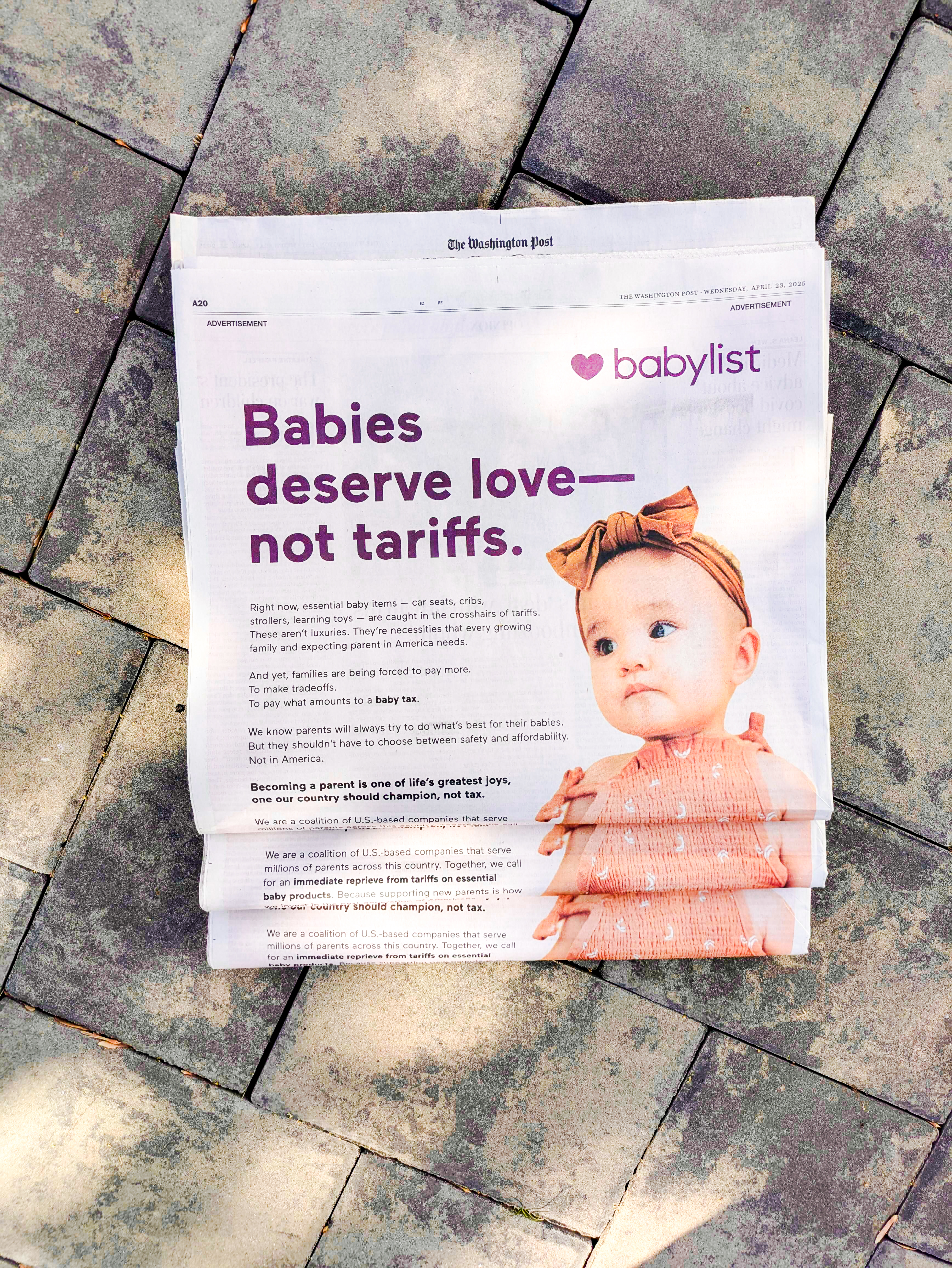
In early 2025, a new wave of tariffs threatened to raise prices on essential baby products by up to 145%. For parents already facing nearly $30,000 in first-year expenses, this “Baby Tax” would have been devastating. For the baby industry, largely made up of small and mid-sized businesses, it posed an existential threat.
As the trusted destination for over 9 million annual shoppers, Babylist knew we had both the platform and responsibility to act. Our goal was clear: make the “Baby Tax” a national issue, advocate for tariff relief, and give families immediate, practical ways to save.
We launched the End the Baby Tax campaign with a a full-page open letter in The Washington Post, signed by leaders from 13 major baby brands. The message was simple: “Babies deserve love — not tariffs.” Within weeks, the coalition doubled to nearly 30 brands, including competitors uniting for the first time to speak with one voice.
The campaign spanned press, policy advocacy, and public engagement: a Times Square digital billboard takeover, appearances on CNN, Bloomberg, and Cheddar, and coverage in The Washington Post and Inc. At the same time, we introduced cost-saving tools like Babylist’s “Open to Secondhand” registry feature, making it easy and stigma-free to request pre-loved baby items.
By combining bold advocacy with tangible help for parents, End the Baby Tax proved that a consumer brand can lead on urgent policy issues, and win support from both an industry and the families it serves.
When the tariff threat emerged in 2025, we knew families didn’t just need empathy, they needed action. Babylist’s strategy had three pillars: mobilize the industry, amplify the issue nationally, and equip parents with cost-saving tools.
Our first move was bold: a full-page ad in The Washington Post declaring, “Babies deserve love — not tariffs.” It was signed by 13 leading baby brand CEOs, many of them direct competitors. The coalition quickly expanded to nearly 30 companies, representing some of the most trusted names in the baby space. By speaking with one voice, we created a united front for families.
We brought the message to the heart of U.S. commerce, Times Square, with Babylist’s first-ever digital billboard takeover. The billboards advocated for babies and families and directed passersby to our End the Baby Tax landing page, to learn more and share their own stories.
Our CEO, Natalie Gordon, became a go-to voice for the cause, coining the term “Baby Tax” and appearing on CNN, Bloomberg, and Cheddar. The campaign generated over 1.7 billion press impressions and positioned Babylist as the face of a critical, underreported issue.
Uniting competitors required diplomacy and trust. Consumer brands rarely engage in public policy advocacy, let alone against government tariffs. But Babylist leaned into its credibility and community connection, proving that a retail brand can lead a policy fight without losing audience trust.
Alongside advocacy, we launched cost-saving tools like “Open to Secondhand,” a first-of-its-kind registry feature that normalized pre-loved gifting. We paired this with content, guides, and social support to help parents stretch their budgets.
By blending leadership, coalition building, and user-focused innovation, we created a campaign that was timely and impactful, showing that the future of brand leadership is bold, collaborative, and deeply human.
The End the Baby Tax campaign exceeded every goal we set.
We became a trusted voice for families navigating rising costs, offering both advocacy and practical tools. The campaign strengthened Babylist’s position as a mission-driven leader in the $320 billion baby product market, deepening trust with our audience and setting a new model for brand advocacy.
We define success not just by reach or revenue, but by impact - and this campaign delivered both. It showed that when the stakes are high, Babylist can unite competitors, influence policy, and give families meaningful support in their everyday lives.
